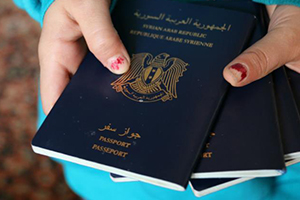 When Amira[1] got married for the first time, the revolution was well underway.
When Amira[1] got married for the first time, the revolution was well underway.
“I was married in an unofficial ceremony. I didn’t have an ID card. When I was four months pregnant, my husband was killed when the regime bombed our village. I was unable to register my daughter’s birth because we had no official marriage contract. I remarried, and I’m pregnant again, but I haven’t been able to register my second marriage either because my first marriage was unofficial and I don’t have my first husband’s death certificate.”
Stories like Amira’s are all too common in much of Syria, where the conflict has stopped the functioning of official institutions responsible for registering and providing documentation on Syrians’ births, deaths, marriages, and divorces. Without this documentation, Syrians are often stuck in legal limbo – unable to get the documents they need because they don’t have the documents they need.
A lack of proper documentation can have severe consequences for Syrians like Amira. The inability to officially register births deprives children of their legal identity and Syrian nationality, and the inability to register deaths threatens the financial stability and property/inheritance rights of widows and other family members. In addition to these issues, women like Amira also have to deal with the risk of building a life with an ‘unofficial’ spouse who is not legally obligated to support his family.
This lack of documentation is also a violation of Syrians’ right under international law, as defected judge Anwar Majanni explains. “The Universal Declaration of Human Rights, as well as the International Covenant on Civil and Political Rights, stipulates that ‘every person everywhere has the right to obtain a legal personality.’” Manjani continues, “This personality that is created through registration in civil records, and its absence interferes with a number of rights, including the right to obtain citizenship, the right to parentage, financial rights, the right of movement, rights related to education and health, and other rights recognized by Syrian law and international covenants and treaties.”
Improper documentation also presents a dark opportunity for the Bashar al-Assad regime to punish those who oppose him and manipulate the country’s demographics. As Majanni explains, “The gaps in civil records will lead to gaps in the election records, depriving many Syrians of their political rights, such as the right to run for elections and vote – to the benefit of the regime. The regime will also benefit from preventing the return of the forcibly displaced due to the loss of documents that prove their identity and their right to return.”
Raising awareness about the lack of civil documentation and helping Syrians access their personal documents is the first step in addressing the issue. “TDA has conducted awareness-raising sessions with local organizations and activists in northwestern Syria to bring their attention to the issue and also to get their perspective on the biggest challenges facing displaced persons related to lack of documentation,” said Mohamad Haddad, Project Coordinator at TDA.
In addition to the awareness-raising sessions, TDA has also released an informational video on the issue to spread the message to a larger audience.
[1] Not her real name.
